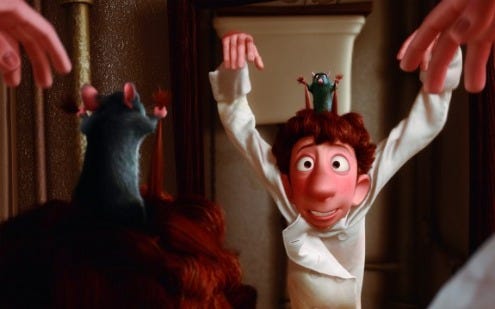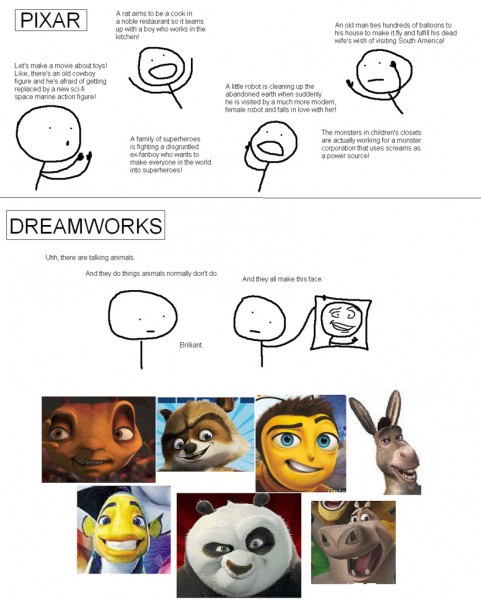Pixar Talk: Ratatouille
Every week, Austin is going to have a chat with Victoria Disque about a Pixar film. This is all leading up to a speech Austin will be giving about Pixar at the E.B. and Bertha C. Ball Center in Muncie on December 9th. Victoria is a producer of The Reel Deal and is currently majoring in telecommunications at Ball State University.

Austin: So you just finished “Ratatouille” for the first time minutes ago. What are your first reactions?
Victoria: I loved it. Within the first half-hour, I knew I was really going to like this movie. It never disappointed me.
Austin: This was Brad Bird, who also directed “The Incredibles” and “The Iron Giant.”
Victoria: I decided I really like him. I mean, I like them all — like John Lasseter — but I really like Brad Bird.
Austin: And he’s moving onto live action with “Mission: Impossible: Ghost Protocol” this winter. Every Pixar film goes through so many changes throughout its production. For this one, Brad Bird was called in a little bit late on the process. This was Pixar’s first film after the legal debacle of Pixar breaking away from Disney and all that madness. So this is their first thing on their own again, yet it feels like a complete movie. It’s so smooth and a wonderful story.
Victoria: I almost thought there was too much going on. But like I said, I loved this movie. There is the restaurant critic to deal with, there is the bitter ex-chef to work with, Remy tries to break away from his family, Linguini being Gusteau’s son. There was just a lot to take in. It all felt smooth, but it did feel complete.
Austin: There is a lot of plot, but I think one of the reasons why it worked was that they didn’t save it all for the end. Linguini gets the restaurant earlier than anyone expects. There’s even a montage where people think the movie could end. You see this more in French films, so it’s fitting that it’s set in Paris.
Victoria: Also, Linguini gets with the girl earlier in the movie — something else you’d expect to save for the very end.
Austin: That’s where you see what is the true point of the story. All of the Linguini stuff is secondary to Remy’s journey of finding his own place as a chef. I think they did a really good job of structuring that.
There are so many movies about “art." There are so many movies about making movies or the romanticism of writing or painting. I like that Pixar decided to not do the obvious one and talked about the art of food. It’s probably one of the best food movies I have ever seen.
Victoria: This is probably really lame, but I watch the Food Network all the time. There is something really relaxing about watching other people make food. I didn’t expect that from animated food. I loved the montage where Remy had to figure out exactly how to pull the hair to make the spaghetti. Even when he was making food as himself, I was surprised how much I was enjoying watching a gutter rat make food.
Austin: That’s the power of animation. Obviously, we can’t smell or taste anything they’re cooking. It has to be entirely visual, basically. One way they did that was to create a great aroma of the kitchen where he smells the soup. What I really loved were the sequences when he closes his eyes and we see the colors around his head mixing together as the tastes blend. It explains something very personal and difficult to convey, and really the best person to display that geeky enthusiasm is Patton Oswalt.
Victoria: I loved his voice. When the rat first started talking, my mind went to him but then it disappeared. Just like all the other Pixar movies, I never think of it again.
Austin: If I had to make an arbitrary list of the best casting from Pixar, I think the top two are in this film. Patton Oswalt is so brilliant. I’ve been a big fan of his standup for years. Whenever he is enthusiastic about loving or hating a film, it’s always the greatest thing because he gets so passionate, so this character is an extension of him. Instead of yelling about “Star Wars," he’s amazed about the taste of the food. It’s so genuine and perfect job casting.
Victoria: Who’s the other one, then?
Austin: Peter O’Toole as Anton Ego.
Victoria: Oh, yeah. That was a surprise for me. I never thought someone as legendary as Peter O’Toole would do an animated movie, but if you’re going to do it, you better do Pixar.
Austin: He brought such gravitas to it. I love Peter O’Toole, but he hasn’t had the best roles lately. He was pretty good in the “Casanova” miniseries and “Venus” was OK. But he was so good in this! Just look at the most talked-about scene from the movie where he takes a bite of the ratatouille. That was pulled off because of what O’Toole had brought to the role before that. Such brilliant filmmaking.
Victoria: I was a bit emotional at that scene. I was a bit choked up during that part because they added so many layers to this critic who, up to that part, was just … a big meanie. You still don’t know why he is that way at the end, but he grew a heart at that moment. It was like the Grinch!
Austin: And his flashback is so brief. You immediately know what is going on at that moment.
Victoria: They are really good at stuff like that. They give you enough story without milking it.
Austin: Then the scene to accompany that was the review.
Victoria: I don’t know if kids understood a word of that but I loved it.
Austin: I first saw this in theaters and before every Pixar film, I’m nervous. Kids are talking before it starts and I almost want to announce, “When the movie starts, you shut up.” But every time, my audience has been great. Everyone’s behaved because they love Pixar just as much as I do. During that scene, everyone knew how to respond. Even if you don’t know every word he’s saying, but they knew the Grinch grew a heart and it’s a good review.
So often, you have films or storytellers talking about critics. More often than not, it’s negative towards them. Everyone’s had a bad review in their life; that’s what happens when you put something out there. They could have easily turned that into a speech against criticism. But it wasn’t that. It was looking at the emotions behind it. Earlier in the film, there is a moment when someone says he hates food, but he says that he loves food and that’s why he’s so harsh on it. In this scene, he sees the potential and joy in food again. Sure, he ends up losing his job because he was discredited when the restaurant was filled with rats. I think if that didn’t happen, he would have stayed on as a critic and enjoyed the food more.
Victoria: Pixar never fails to surprise me. Any other animation company would go with the easy ending, the really, really happy ending. There were two parts that surprised me in this. The first was when Linguini was telling all of the chefs that Remy was cooking. You’d expect them to stay and deal with it, but they all leave. Then all the rats help out, which I didn’t see coming.
Then I didn’t see the ending coming, either. I thought it would be happily ever after, but the restaurant closes down. Then they have the smaller restaurant, which is probably less stressful and the rats can eat there. So it seems like a sadder ending, but it works more for the characters.
Pixar is fantastic at taking something so unrealistic and then making it as realistic in that concept.
Austin: I think this is the most unrealistic of them all with having Remy pull Linguini’s hair and making him move. For that is impossible … and insane. So they should walk out because what he is describing is madness. I would stay to see it all play out because that would be entertaining. That is the most fantastical element of any Pixar films aside from talking animals and inanimate objects.
However, the film does it so well. It takes the metaphor of the puppeteer and makes it literal. Even though it’s incredibly unrealistic, it works out best for both of them. You don’t really get the vibe that Linguini wants to be a chef, just that he wants to be in the kitchen.
Victoria: It seems that he wants to be part of something. His mom is gone. His father he never knew is gone. He doesn’t have anywhere to really call his own. The one question I had in the whole movie is when he first gets the job, why does he add stuff to the soup when nobody was looking?
Austin: Oh, because he’s an idiot.
Victoria: You’re just taking random things and putting them in a pot!
Austin: I think he wanted to contribute more than just taking out the trash. Looking at what you’re saying, I think he wants to be part of a group. The kitchen is like a family. Aside from the crazy French Ian Holm villain, the kitchen is a very warming place for him. (Transcriber's note: That was an unintentional pun.) He finds the love of his life, there are quirky other characters that support him, he has rat friends. It does work well as a community. I think he was just trying to get to that point.
I do like this film quite a bit, but I guess the only part I don’t like is Remy’s family storyline. Watching it this time, I really got the metaphor of rats are like criminals. Linguini always thinks Remy is going to steal all the food and run out on him. Then there are the old “You can’t escape your past” and the “mobster who wants to go straight” tropes that operate with this family. They are thieves, but in a more respectful light they are animals. I know it was necessary for the plot, but when they opposed his lifestyle, it seemed awkward. It did pay off when it they came together, though.
Victoria: You know I saw this thing on my friend’s Tumblr that really sums up the differences between Pixar and Dreamworks. Pixar puts so much work into their stories where even if it doesn’t pay off, they’re trying really hard to make something special.

Austin: That is so awesome. You know, there really isn’t anything like “Ratatouille." It has elements that are familiar, but it all blends together to be a completely unique movie. It’s really great.
Victoria: Loved it!


